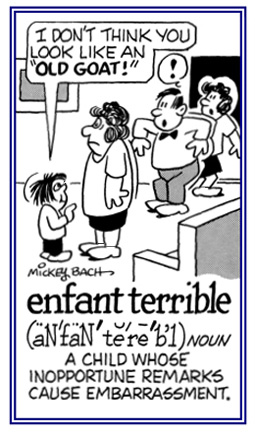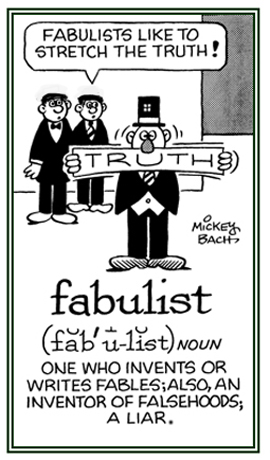fa-, fam-, fan-, fant-, fat-, -fess; fab-, fabul-
(Latin: fari-, "to say, to talk"; telling, speak, say, spoken about; acknowledge)
2. To charge someone falsely or with malicious intent.
2. Someone whose unconventional or controversial behavior or ideas shock, embarrass, or annoy another person or people; a person who is indiscreet or lacks a sense of responsibility: There are those who feel that some talk show hosts are extending their former juvenile characteristics as enfants terribles into their adult behaviors.
3. Etymology: from French; literally, "terrible child".

Go to this Word A Day Revisited Index
so you can see more of Mickey Bach's cartoons.
"The teacher told her students the fable about the fox and the grapes."
2. A story about supernatural, mythological, or legendary characters and events: "Aesop's fables have given us such useful expressions and sayings as sour grapes, and one good turn deserves another good turn.3. A false or improbable account of something: "Ervin's story about his pirate ancestor is probably another one of his fables."
4. Myths and legends (fables) collectively.
5. Etymology: from Old French fable, from Latin fabula, "story, play, fable"; literally, "that which is told", from fari, "to speak, to tell"; related to Latin fama, "talk, rumor, report, reputation."
Greek phama, "fame", and phanai, "to speak", are also related to Latin fari.
Fables, a collection of stories attributed to Greek writer Aesop (c. 6th century B.C.). Many of the tales feature animals as characters and each one illustrates a specific moral. It is traditionally said to be the origin of the literary fable (although earlier examples have been found), they were used by the ancient Greeks for both educational and rhetorical purposes.
We should distinguish between the fable and the myth. A fable is a story, like “The Fox and the Grapes”, in which characters and plot, neither pretending to be real nor demanding believability, are fabricated as the vehicle of moral or didactic instruction.
Myths, on the other hand, are stories of anonymous origin, prevalent among primitive peoples and by them accepted as true, concerning supernatural beings and events, or natural beings and events influenced by supernatural agencies.
Fables are made by individuals; they may be told in any stage of a nation’s history. They are vessels made to order into which a lesson may be poured. Myths are born, not made. They are born in the infancy of a people and their culture.
2. A story or statement that is not true: Carmela combines fact and fable to make her novel more interesting.
As a storyteller, Dudley often used a fable to illustrate a charming foible in a character’s personality.
2. Telling invented or untrue stories.
2. Etymology: "from Latin fabulat, narrated as a fable; from the verb fabulari, "speak, say."
2. A narrator who recites tales or tells stories ending with a moral: Steven was considered to be a great fabulist and so he was asked to entertain a group of friends with supernatural myths and legends when they got together in the evenings.

Go to this Word A Day Revisited Index
so you can see more of Mickey Bach's cartoons.
2. Amazingly or almost unbelievably great or wonderful: Bert's business grew increasingly profitable, earning him a fabulous wealth.
3. Relating to the contents of imaginary myths or legends: Everyone should read the story of “The Flight of Icarus”, which describes the fabulous flight of Daedalus and his son Icarus by using great wings made of feathers.

Go to this Word A Day Revisited Index
so you can see more of Mickey Bach's cartoons.
2. Relating to, or describing, that which is typical of myths and legends.
3. Characterized by being extremely good, pleasant, or enjoyable.
2. Someone’s reputation or a situation whereby a person is known, or talked about, by many people; especially, because of notable achievements.
3. Etymology: from "celebrity, renown", which came from Old French fame, from Latin fama, "talk, rumor, report, reputation"; literally, "saying", from the stem of fari, fatus, "to speak"; related to fateri, "to confess", fabula, "narrative, account, tale, story", fas, "divine law".
Cross references of word families that are related directly, or indirectly, to: "divination, diviner; seer, soothsayer, prophecy, prophesy, prophet": augur-; auspic-; Fates in action; futur-; -mancy; omen; -phemia; sorc-, sorcery; vati-.


